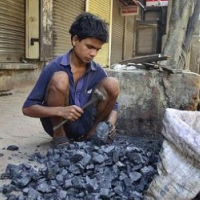Govt Looks to Free Labour Laws
 93% of workers are employed in the informal sector
93% of workers are employed in the informal sector
The Modi administration has reportedly begun the process of revamping India’s archaic labour laws. Observers hold these laws responsible for restricting businesses from ramping up employment. If the government succeeds in freeing India’s labour market it would boost manufacturing and create millions of jobs.
India needs 12 million new jobs every year to absorb the youth entering the job market, but the country created only 5 million manufacturing jobs between 2004/5 and 2011/12.
A World Bank report noted in 2014 that India has one of the most rigid labour markets in the world and "although the regulations are meant to enhance the welfare of workers, they often have the opposite effect by encouraging firms to stay small and thus circumvent labour laws".
In 2009, 84% of India's manufacturers employed fewer than 50 workers, compared to 25% in China, according to a recent study by consultancy firm McKinsey & Co.
According to Reuters, populism and fears of a union-led backlash have prevented previous administrations from considering changes to labour regulations.
But with a decisive mandate provided by voters in the general election in May, pro-business Prime Minister Narendra Modi has made it a top priority to overhaul the labour market in his government's first 100 days in office.
First up, the administration is expected to make changes that benefit workers, such as making more workers eligible for minimum wages, increasing overtime hours, and allowing women to do night shifts.
The next and more difficult task on the reform agenda will be to loosen strict rules that make it hard to dismiss workers. Currently, government clearance is required to fire more than 100 workers and this is rarely granted.
Companies blame these regulations for India’s small manufacturing sector as it is almost impossible to respond to business cycles.
"If business cycles are volatile, the ability to downsize and upsize should be freely available," said R. Shankar Raman, chief financial officer at Larsen & Toubro, told Reuters.
Manufacturing contributes just 15% to India's economy, compared to 45% of China’s GDP in 2012. New Delhi says it wants to increase that share to 25% within a decade, creating 100 million jobs.
Since almost all the unions in the country are affiliated to political parties, their opposition to labour reform could turn into a full-scale political agitation. But the government has a strong majority in Parliament, so it can weather this resistance if it has the political will.
The labour ministry has asked for public comments by early July on the changes it plans to the Minimum Wages Act (1948), which sets minimum wages for skilled and unskilled labour, and the Factories Act (1948), which governs health and safety.
The laws benefit only a fraction of the workforce as 93% of workers are employed in the informal sector and lack any form of job or social security.
The proposed changes would standardize minimum wages nationally while increasing the frequency of salary revisions based on increases in consumer prices. This is expected to help bring millions of workers into the formal economy.
- Top Stories
- Controversies
- Where is the Money Going?
- India and the World
- Appointments and Resignations
- Unusual News
- Latest News
- India College Chain’s Expansion into U.S. Draws Opposition from Massachusetts Officials over Quality of Education
- Milk Shortages in India Tied to Release of New Movies Featuring Nation’s Favorite Stars
- Confusion Swirls around Kashmir Newspaper Ban in Wake of Violent Street Protests
- Polio-Free for 5 Years, India Launches Vaccine Drive after Polio Strain Discovery
- New Aviation Policy Could Increase Service, Lower Ticket Prices






Comments